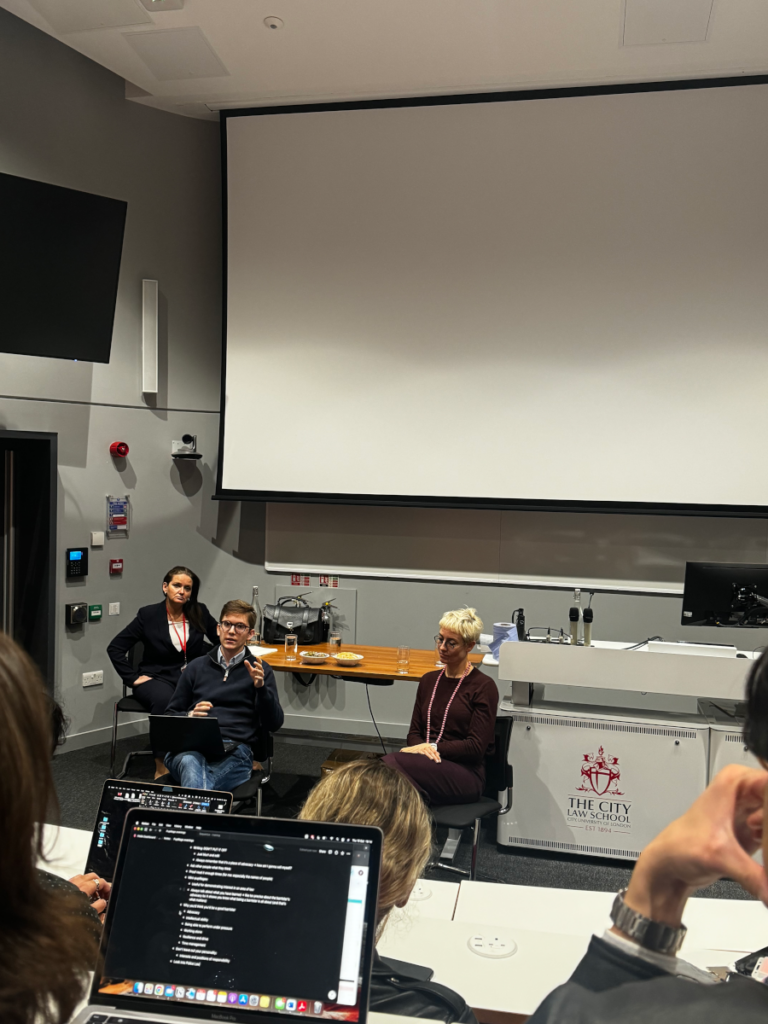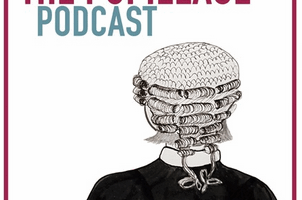The Pupillage Advisory Service at The City Law School recently hosted The Path to Pupillage, an event designed to help students navigate the Pupillage application process. The session provided invaluable insights on approaching the application season, offering practical guidance on planning, preparation, and key elements of a successful application.

Leading the discussion were Beatrice Collier and Conor Monighan, barristers from 5 Essex Court. As co-producers of Middle Temple’s The Pupillage Podcast and authors of The Path to Pupillage, they also run social media accounts dedicated to assisting aspiring barristers, including X @pupillages and Instagram @5essexchambers_pupillages. During the session, they shared their expertise on what chambers look for in aspiring barristers, how to structure applications effectively, and how to make your application stand out from the competition.
This event provided a detailed roadmap for students aiming to secure pupillage, ensuring they are well-prepared for the challenges ahead.
Beatrice Collier on Pupillage Applications: Essential Guidance for Aspiring Barristers
Beatrice Collier opened the session with practical advice on the structure and key elements of pupillage applications. She emphasised the importance of thorough preparation and planning, outlining a detailed checklist for applicants to follow.
Beatrice encouraged attendees to begin their applications by explaining their chosen area of practice and the reasons for applying to a specific set of chambers. She outlined key sections of the application, including employment and education history, work experience, scholarships or prizes (if applicable), and both written and oral advocacy experience. Additionally, she highlighted the importance of showcasing positions of responsibility, personal interests, and recreational activities.
A crucial part of any application, according to Beatrice, is articulating why you want to be a barrister and what makes you a good fit for the profession. Equally important is explaining why you want a pupillage and why you’ve chosen the particular chambers to which you’re applying.
In terms of planning, Beatrice recommended setting aside at least two hours for application preparation and emphasised the need to “think beforehand” when writing. She highlighted the core skills every aspiring barrister should focus on:
…advocacy, writing, clear communication, client relations, attention to detail, patience, listening and analytical thinking
To stand out, applicants should identify where they have demonstrated these skills, linking their experiences directly to the role of a barrister.

She stressed that it’s not just legal experience that matters. Non-legal roles, such as work in customer service, hospitality, or retail, can be equally valuable if you can show how these experiences have honed relevant skills. For instance, a waiter or chef may have developed strong client-facing skills, which are critical for barristers. The key, according to Beatrice, is to connect your experiences with the demands of life at the Bar.
“When writing applications, don’t procrastinate,” Beatrice urged. “Stay composed, get it done, and sell yourself and your passion to chambers.” She recommended reviewing your application at least three times and having others proofread it as well, ensuring the final product is error-free and polished.
If you have completed mini-pupillages or work experience with solicitors, Beatrice advised including reflections on the skills and insights you gained, particularly regarding the Bar and advocacy. Short-term experiences should also be included, as they can demonstrate your ability to gain and apply new skills quickly.
Lastly, Beatrice underscored the importance of injecting personality into your application. Hobbies, interests, and recreational activities can help humanise your application, allowing chambers to see a more well-rounded individual who brings a unique perspective to the profession.
Conor Monighan on Chambers and the Pupillage Application Process
After Beatrice concluded her insightful talk, Conor Monighan took the stage to speak in detail about chambers and the practicalities of applying for pupillage.

He opened with an encouraging statement: “This is all doable,” reminding attendees that they don’t need to be from privileged backgrounds to succeed at the Bar. However, he noted that becoming a barrister requires a lot of hard work and, sometimes, a bit of luck. A minimum 2:1 degree is essential applications with a 2:2 are rarely accepted unless there are mitigating circumstances.
Conor discussed the differences between the solicitor and barrister routes, pointing out that those with a passion for advocacy, oral argument, and courtroom work should lean towards the Bar. In contrast, those who prefer other aspects of legal practice, like paperwork and client management, might be better suited to the solicitor path.
When considering which area of law to practise in, Conor emphasised the importance of conducting detailed research. Understanding the availability of advocacy in your chosen field is crucial. For instance, criminal law offers the most opportunities for advocacy, with barristers in court almost daily, while commercial law tends to involve less courtroom time. He advised selecting a set of chambers that offers a range of legal specialisations, combining both specialists and generalists, to increase your exposure and versatility.
To deepen your understanding, Conor recommended attending pupillage fairs and speaking directly to experts in your area of interest. He also encouraged students to listen to resources like The Pupillage Podcast to stay informed and prepared.
Moving on to the pupillage application itself, Conor stressed that spelling, punctuation, and grammar (SPAG) are paramount. Attention to detail is crucial, and one common mistake is forgetting to change the name of the chambers when submitting applications, which can leave a negative impression. He urged candidates to know their audience, keep their writing concise, and avoid unnecessary adjectives or “waffling.”

In terms of structure, Conor likened the application to making an argument: “It’s an argument for chambers to take you in.” He advised proving your claims with real examples, whether from legal work experience or even retail jobs, demonstrating that you meet the chambers’ criteria. Many chambers publish reports on what they are looking for in applicants—these are “gold mines,” as Conor put it, and should be thoroughly reviewed to understand the dos and don’ts.
Conor also mentioned the importance of submitting applications well before the deadline to avoid any technical issues like glitches or crashes. “Do not submit the night before,” he cautioned. Instead, aim to submit at least 48 hours in advance to ensure your application is successfully processed.
Reiterating a key point from earlier, Conor once again emphasised that a 2:1 degree is typically required, though mitigating circumstances might allow a 2:2 to be accepted. Prizes, awards, and scholarships are valuable additions to your application, as they showcase your achievements and commitment.
Like Beatrice, Conor urged students to include all relevant experiences, even shadowing opportunities, as they hold significant value. However, he made an important distinction: mooting, while beneficial, should not be listed under recreational activities, as it is considered an academic pursuit.
He stressed the need to clearly explain why you’ve chosen a particular set of chambers and why they should choose you. Researching the chambers’ pupillage section on their website, as well as the profiles of junior tenants, can provide useful insights into what they look for in candidates.
At pupillage fairs, Conor advised having a plan and preparing a set of questions in advance. This allows candidates to make the most of the opportunity and get valuable information that could enhance their applications.
Like Beatrice, Conor placed a strong emphasis on explaining why you want to be a barrister and why you would make a good one. Identifying a key skill, such as advocacy, and backing it up with specific examples—like winning a competition or prize—will help make your application stand out.
Conor also suggested practising your answers out loud to improve clarity and shake off nerves. Chambers may even ask you to debate random topics as part of their recruitment process, so it’s essential to be prepared to think on your feet.
He wrapped up his talk by reminding students that “there is no rush” and that “taking your time is okay.” If you decide to take a gap year, use it wisely—volunteering or working for legal charities can provide valuable experience and keep you engaged with the legal profession.
Key Takeaways for Aspiring Barristers
The Path to Pupillage event, led by Beatrice Collier and Conor Monighan of 5 Essex Court, provided a wealth of practical advice for aspiring barristers. From how to structure applications to the skills chambers look for, attendees are left equipped with essential tools for success in the highly competitive pupillage process.
Beatrice Collier’s focus on meticulous preparation and connecting past experiences with the demands of life at the Bar offered invaluable guidance on building a strong application. Her emphasis on non-legal roles as valuable experience was a reminder that any job if presented correctly, can showcase key barrister skills like advocacy and client relations. Similarly, injecting personality and showcasing personal interests can help humanise an application and make it stand out.
Conor Monighan reinforced these points by outlining the practical steps needed to succeed, from choosing the right chambers to ensuring your application is error-free. His advice on researching your chosen area of law, attending pupillage fairs, and practising clear communication was essential for students seeking to demonstrate their passion and potential.

The overarching message was clear: preparation, planning, and persistence are key to navigating the pupillage process. Aspiring barristers need not only academic credentials but also well-rounded experiences, resilience, and a thoughtful approach to each application. Both Beatrice and Conor’s insights underscored that with the right focus and determination, securing a pupillage is within reach.
Thanks to Hamedur for this review.
Hamedur has a keen interest in family law and a strong ambition to become a family solicitor. Beyond his studies, he actively engages in teaching calisthenics to youths in various boroughs, promoting both fitness and community cohesion. His dedication to giving back to local communities drives his volunteer work with the charity Under One Sky, where he contributes to efforts to end homelessness. He thrives on meeting new people and making a tangible impact in their lives. Recently, he discovered a hidden passion for running and now aspires to one day participate in charity runs for organisations such as Save the Children and The British Red Cross.

